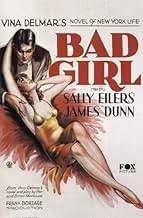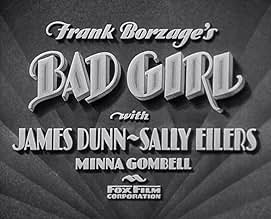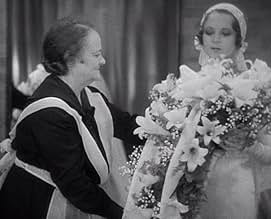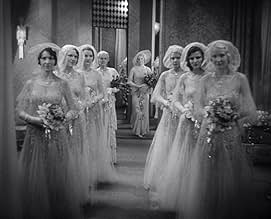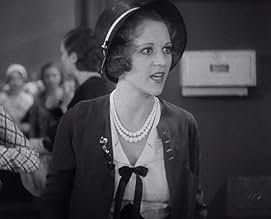CALIFICACIÓN DE IMDb
6.4/10
1.8 k
TU CALIFICACIÓN
Agrega una trama en tu idiomaTwo adolescents fall in love and are wed, but misunderstandings born from a lack of trust and communication haunt their marriage.Two adolescents fall in love and are wed, but misunderstandings born from a lack of trust and communication haunt their marriage.Two adolescents fall in love and are wed, but misunderstandings born from a lack of trust and communication haunt their marriage.
- Dirección
- Guionistas
- Elenco
- Ganó 2 premios Óscar
- 6 premios ganados y 1 nominación en total
Frank Austin
- Upstairs Tenement Neighbor
- (sin créditos)
Irving Bacon
- Expectant Father
- (sin créditos)
William Bailey
- Expectant Father of Twins
- (sin créditos)
Sue Borzage
- Unknown
- (sin créditos)
Jesse De Vorska
- Expectant Father
- (sin créditos)
Bud Eilers
- Man Outside Candy Shop
- (sin créditos)
Edward Hearn
- Male Nurse
- (sin créditos)
Aggie Herring
- Seamstress
- (sin créditos)
Claude King
- Dr. Burgess
- (sin créditos)
Louis Natheaux
- Mr. Thompson
- (sin créditos)
Sarah Padden
- Mrs. Gardner
- (sin créditos)
Lorin Raker
- Male Nurse
- (sin créditos)
Opiniones destacadas
Note: some scenes described in detail.
As usual for Borzage, this is full of sentiment, and the details of the plot are deadly. Never was the development of misunderstandings between two inarticulate people more aggressively, one might say more ruthlessly, pursued. When they're not playing "Gift of the Magi" (he giving up the dream of his own radio store for the big apartment he thinks she wants), they're busy each thinking that the other doesn't really want the baby. And how could Borzage resist milking the maternity ward scene, with its inevitable ethnic cross-section, older woman, and troubled mother. And here's another version of that typical pre-Code era film pair, the beautiful girl and the unhandsome blow-hard boob.
All that said, this is still a very good film in spite of itself, certainly deserving of its Academy Award nomination for Best Picture. Borzage constantly redeems himself at the worst moments. A prime example: the evening before the baby's due Jimmy goes out to fight four rounds of preliminaries at $10 a round to pay the doctor. Sally is lying at home, convinced that he's with his drunken friends, or worse, and no longer loves her. Dunn's opponent is a mean-looking, cynical, paunchy guy who's about to knock him out in the second round. Oh, the ironic cross-cutting: he's getting the crap beat out of him, while she lies in bed, anxious and bitter. But, in a clinch, Jimmy begs the pug not to knock him out because his wife's going to have a baby. Why didn't you say so, says the obliging pug, I've got two of my own. In an amusing moment they chat away while pretending to lambaste each other. This takes the curse off the sentimental plot maneuvering.
And there are a lot of other fine sequences, too. The film starts with Eilers in a fancy wedding gown, being attended to by a dresser. She's so nervous, she tells best-friend Gombell, who's dressed as a bridesmaid. As they do the formal bride's walk through the phalanx of bridesmaids, in the corner of the screen one sees part of a tray of dirty dishes being carried by a waiter. Gradually the camera pulls back to show that they're modeling the gowns for a bunch of lecherous buyers. Then they go to Luna Park (nice shots of the park). Throughout these early scenes there are plenty of sharp pre-Code wisecracks about how men only have one thing on their minds. Funny, breezy stuff. They meet Dunn on the ferry on the way home, the first guy that doesn't make a pass. The scene shifts to the couple sitting at the foot of her rooming-house stairwell. As they talk, an old hen-pecked lush comes down the stairs, and an older woman uses the hall phone to tell her sister that their mother has just died. That may be pouring the milieu on a bit thick, Borzage style, but this scene is beautifully played by Eilers and by the older woman and is quite affecting. Later, when Eilers stays in Dunn's room (no hanky-panky, it seems) and he asks her to marry him, her brother kicks her out of the house, and Gombell, the brother's gal, walks too. (Single-mom Gombell's little boy is a terror. In the morning he won't scram: "I want to see Dotty get out of bed.") Sally is sure that Jimmy will desert her at the alter, and that's the beginning of all the tear-jerking plot elements.
But the film goes beyond those elements with a richness of detail, a generous painting of daily life in the city during the Depression. And, when all's said and done, what really makes the film, and where Borzage ultimately redeems himself, is in the performances. Eilers, who somehow never got the recognition she deserved, is beautiful and gives a strong, sensitive, emotional performance--for my money a more appealing one than most of Janet Gaynor's work for Borzage. Gombell, another undervalued thirties player, is really fine as the tough but good-natured pal, who doesn't let Dunn's dislike of her color her opinion of him as a good husband for Eilers. Her performance goes beyond the requirements of the script in very subtle ways. And Dunn, well, he plays the typical early-thirties boob of a husband, but even he has a bravura scene when he breaks down while having to beg the expensive doctor to handle his wife's childbirth. Borzage films are always full of sentiment, but not always honest sentiment. This scene with the doctor is full of sentiment, but it's honestly handled, and one can say the same for the whole film.
As usual for Borzage, this is full of sentiment, and the details of the plot are deadly. Never was the development of misunderstandings between two inarticulate people more aggressively, one might say more ruthlessly, pursued. When they're not playing "Gift of the Magi" (he giving up the dream of his own radio store for the big apartment he thinks she wants), they're busy each thinking that the other doesn't really want the baby. And how could Borzage resist milking the maternity ward scene, with its inevitable ethnic cross-section, older woman, and troubled mother. And here's another version of that typical pre-Code era film pair, the beautiful girl and the unhandsome blow-hard boob.
All that said, this is still a very good film in spite of itself, certainly deserving of its Academy Award nomination for Best Picture. Borzage constantly redeems himself at the worst moments. A prime example: the evening before the baby's due Jimmy goes out to fight four rounds of preliminaries at $10 a round to pay the doctor. Sally is lying at home, convinced that he's with his drunken friends, or worse, and no longer loves her. Dunn's opponent is a mean-looking, cynical, paunchy guy who's about to knock him out in the second round. Oh, the ironic cross-cutting: he's getting the crap beat out of him, while she lies in bed, anxious and bitter. But, in a clinch, Jimmy begs the pug not to knock him out because his wife's going to have a baby. Why didn't you say so, says the obliging pug, I've got two of my own. In an amusing moment they chat away while pretending to lambaste each other. This takes the curse off the sentimental plot maneuvering.
And there are a lot of other fine sequences, too. The film starts with Eilers in a fancy wedding gown, being attended to by a dresser. She's so nervous, she tells best-friend Gombell, who's dressed as a bridesmaid. As they do the formal bride's walk through the phalanx of bridesmaids, in the corner of the screen one sees part of a tray of dirty dishes being carried by a waiter. Gradually the camera pulls back to show that they're modeling the gowns for a bunch of lecherous buyers. Then they go to Luna Park (nice shots of the park). Throughout these early scenes there are plenty of sharp pre-Code wisecracks about how men only have one thing on their minds. Funny, breezy stuff. They meet Dunn on the ferry on the way home, the first guy that doesn't make a pass. The scene shifts to the couple sitting at the foot of her rooming-house stairwell. As they talk, an old hen-pecked lush comes down the stairs, and an older woman uses the hall phone to tell her sister that their mother has just died. That may be pouring the milieu on a bit thick, Borzage style, but this scene is beautifully played by Eilers and by the older woman and is quite affecting. Later, when Eilers stays in Dunn's room (no hanky-panky, it seems) and he asks her to marry him, her brother kicks her out of the house, and Gombell, the brother's gal, walks too. (Single-mom Gombell's little boy is a terror. In the morning he won't scram: "I want to see Dotty get out of bed.") Sally is sure that Jimmy will desert her at the alter, and that's the beginning of all the tear-jerking plot elements.
But the film goes beyond those elements with a richness of detail, a generous painting of daily life in the city during the Depression. And, when all's said and done, what really makes the film, and where Borzage ultimately redeems himself, is in the performances. Eilers, who somehow never got the recognition she deserved, is beautiful and gives a strong, sensitive, emotional performance--for my money a more appealing one than most of Janet Gaynor's work for Borzage. Gombell, another undervalued thirties player, is really fine as the tough but good-natured pal, who doesn't let Dunn's dislike of her color her opinion of him as a good husband for Eilers. Her performance goes beyond the requirements of the script in very subtle ways. And Dunn, well, he plays the typical early-thirties boob of a husband, but even he has a bravura scene when he breaks down while having to beg the expensive doctor to handle his wife's childbirth. Borzage films are always full of sentiment, but not always honest sentiment. This scene with the doctor is full of sentiment, but it's honestly handled, and one can say the same for the whole film.
I finally tracked down Bad Girl. It had been on my list of wanna sees for years as it had won a major Oscar for Best Director- Frank Borzage.It was one of those tantalizing early talkies that had not actually been lost it had merely fell from sight. When I finally saw it last year at a Borzage revival, the film was a revelation.It was a pre-code delight about an ordinary couple, falling in love, struggling financially and having a baby etc.It most reminded me of the great silent film-The Crowd, which dealt with similar matters. What was especially fascinating to me was its depiction of "average" lower middle class types and how they lived and spoke in Depression America. The apartments... the slang, all of it, seemed real. It wouldn't be until the 50's neo realism hit American movies that we would see ordinary people depicted on the screen again, without condescension The movie has all the Borzage trademarks- love surviving against all odds, even an exciting if a little hokey climax.Unfortunately, the film has been slighted often in movie books,most likely, because the authors have never actually seen it. If it is ever shown again, try to see it. It's a wonderful peek at average city folks in Depression America.
An interesting little Borzage love story set during the Depression, detailing the struggles of young couple (Sally Eilers & James Dunn) with their hopes and dreams. Curiously Borzage won his second Oscar as Best Director for this oddly heady little movie and that's perhaps the only reason to watch it. It works as a timepiece of its era. But I definitely wouldn't call "Bad Girl" one of Borzage's best romances (in many ways it strikes me as turgid and unaffecting in several moments, and I didn't like the ending), but it is definitely worth catching if you are fan or a student of the director's sublime and unheralded oeuvre.
A wildly uneven film that seems as confused as its marketing. The pre-Code era was known for salacious titles and advertisement, but I don't think I've ever seen a film more at odds with its poster. I'm not kidding, these are the words underneath the poster of the main character (Sally Eilers) leaning back with her ukulele:
EVERYBODY KNOWS THIS GIRL There's one in every town Tumult in her heart. She wanted things. Clothes. Boy friends. Fun. Gayety. Kisses. * Red-lipped shop girl in sleazy dress, Aching with suppressed emotions ... dance halls ... excursion steamers ... chop suey palaces ... Coney Island ... clinging farewells ... then back to the hall bedroom. * Drama of girls ... who love to live. Laughter of girls ... who live to love. * It's romance of the working girl ... today ... your most dependable patron.
In the actual film, nothing could be further from the truth. Eilers' character is not loose, flirtatious, or even pushing on the boundaries of the role women were assigned to. We see a lot of bad male behavior though, e.g. men coming on to her (leading her to remark to her friends that all of them have just one thing on their minds), a controlling brother who hits her for coming home late (alluded to, not shown), and even the guy she's attracted to (James Dunn) doling out insults and mansplaining things. When the two marry on a whim because she fears facing her brother after coming home at 4 am (though not having had sex), he also tells her that no wife of his will be getting a job.
The best part of the film is the support she gets from her friend (Minna Gombell), a tough talking woman who stands up for her. She literally flicks her husband's chin upwards while fixing his tie, and the two part with this exchange: "Bye, Grouch" / "So long, Dizzy."
The film providing a window into the conditions women faced and the bond between friends is when it's at its best, but it's less successful afterwards. At its center this is a relationship picture, with the married couple dealing with tight finances, and miscommunicating when she gets pregnant (they both think the other doesn't want a baby). It got quite tiresome over the last half hour for me. Dunn has a weepy scene where his acting leaves a lot to be desired, then improbably offers himself up in a boxing match for money. The nurse at the hospital oddly teases Eilers' character by bringing out several different babies before giving her hers, and all of these scenes seem like filler for a film that lost its way.
As for the Oscar that director Frank Borzage won for this film, it's frankly hard to understand. It's an average film for the period, with nothing that stood out. The images of light and shadow that Josef von Sternberg captured with Marlene Dietrich in 'Shanghai Express,' on the other hand, are immortal. That year also saw so many other great efforts, e.g. Ernst Lubitsch (The Smiling Lieutenant), Rouben Mamoulian (Dr. Jekyll and Mr. Hyde), Clarence Brown (A Free Soul), Fritz Lang (M), William A. Wellman (The Public Enemy), F.W. Murnau (Tabu), King Vidor (Street Scene), Frank Capra (The Miracle Woman), and Roy del Ruth (Blonde Crazy). I usually don't like to fixate on awards and apologize for this long and pedantic laundry list, but my point is that if you're looking for a stellar film from 1931, you can do so much better than this one.
EVERYBODY KNOWS THIS GIRL There's one in every town Tumult in her heart. She wanted things. Clothes. Boy friends. Fun. Gayety. Kisses. * Red-lipped shop girl in sleazy dress, Aching with suppressed emotions ... dance halls ... excursion steamers ... chop suey palaces ... Coney Island ... clinging farewells ... then back to the hall bedroom. * Drama of girls ... who love to live. Laughter of girls ... who live to love. * It's romance of the working girl ... today ... your most dependable patron.
In the actual film, nothing could be further from the truth. Eilers' character is not loose, flirtatious, or even pushing on the boundaries of the role women were assigned to. We see a lot of bad male behavior though, e.g. men coming on to her (leading her to remark to her friends that all of them have just one thing on their minds), a controlling brother who hits her for coming home late (alluded to, not shown), and even the guy she's attracted to (James Dunn) doling out insults and mansplaining things. When the two marry on a whim because she fears facing her brother after coming home at 4 am (though not having had sex), he also tells her that no wife of his will be getting a job.
The best part of the film is the support she gets from her friend (Minna Gombell), a tough talking woman who stands up for her. She literally flicks her husband's chin upwards while fixing his tie, and the two part with this exchange: "Bye, Grouch" / "So long, Dizzy."
The film providing a window into the conditions women faced and the bond between friends is when it's at its best, but it's less successful afterwards. At its center this is a relationship picture, with the married couple dealing with tight finances, and miscommunicating when she gets pregnant (they both think the other doesn't want a baby). It got quite tiresome over the last half hour for me. Dunn has a weepy scene where his acting leaves a lot to be desired, then improbably offers himself up in a boxing match for money. The nurse at the hospital oddly teases Eilers' character by bringing out several different babies before giving her hers, and all of these scenes seem like filler for a film that lost its way.
As for the Oscar that director Frank Borzage won for this film, it's frankly hard to understand. It's an average film for the period, with nothing that stood out. The images of light and shadow that Josef von Sternberg captured with Marlene Dietrich in 'Shanghai Express,' on the other hand, are immortal. That year also saw so many other great efforts, e.g. Ernst Lubitsch (The Smiling Lieutenant), Rouben Mamoulian (Dr. Jekyll and Mr. Hyde), Clarence Brown (A Free Soul), Fritz Lang (M), William A. Wellman (The Public Enemy), F.W. Murnau (Tabu), King Vidor (Street Scene), Frank Capra (The Miracle Woman), and Roy del Ruth (Blonde Crazy). I usually don't like to fixate on awards and apologize for this long and pedantic laundry list, but my point is that if you're looking for a stellar film from 1931, you can do so much better than this one.
Bad Girl is another of Frank Borzage's romantic dramas of the trials and tribulations of lovers usually caught in circumstances and forces beyond their
control. In this case it's the Great Depression and their own attitudes about
romance itself.
Their attitudes being that romance is just a lot of bunk. But attitude or not James Dunn who was making his feature film debut and Sally Eilers are in love in spite of themselves.
I'm not quite sure why the film is entitled Bad Girl since there really isn't nothing bad about Eilers at all. Possibly her original attitude though that is quickly corrected. These are just two people trying to get by, but they always seem to misjudge attitudes because of first impressions and say the wrong things at time.
Take for instance the new apartment that Dunn uses all his savings in to impress Eilers. He says exactly the wrong thing about the two of them living only for today. That's just at the time she was about to break the news that wasn't to be two any more, but three.
Dunn really loves her. How many husbands to earn an extra couple of dollars would go out and try to go 4 rounds with a professional prizefighter? Charles Sullivan proves to be a good guy however.
So does Claude King as the obstetrics specialist who does Dunn a solid when Dunn wants him for his wife's delivery. None but the best as Dunn beautifully carries off a scene breaking down begging for King's services.
The film adapted from a Broadway play of the previous year won an Oscar for adapted screenplay. It also won for Frank Borzage an Oscar for Best Director.
Today's audiences might get a kick out of the prices and the amounts needed for many things. Inflation has come a long way since. Still the themes are universal and I think Bad Girl holds up well today.
Their attitudes being that romance is just a lot of bunk. But attitude or not James Dunn who was making his feature film debut and Sally Eilers are in love in spite of themselves.
I'm not quite sure why the film is entitled Bad Girl since there really isn't nothing bad about Eilers at all. Possibly her original attitude though that is quickly corrected. These are just two people trying to get by, but they always seem to misjudge attitudes because of first impressions and say the wrong things at time.
Take for instance the new apartment that Dunn uses all his savings in to impress Eilers. He says exactly the wrong thing about the two of them living only for today. That's just at the time she was about to break the news that wasn't to be two any more, but three.
Dunn really loves her. How many husbands to earn an extra couple of dollars would go out and try to go 4 rounds with a professional prizefighter? Charles Sullivan proves to be a good guy however.
So does Claude King as the obstetrics specialist who does Dunn a solid when Dunn wants him for his wife's delivery. None but the best as Dunn beautifully carries off a scene breaking down begging for King's services.
The film adapted from a Broadway play of the previous year won an Oscar for adapted screenplay. It also won for Frank Borzage an Oscar for Best Director.
Today's audiences might get a kick out of the prices and the amounts needed for many things. Inflation has come a long way since. Still the themes are universal and I think Bad Girl holds up well today.
¿Sabías que…?
- TriviaWilliam Pawley played the role of Dorothy's brother in the stage version, and reprises his role here in the film.
- ErroresAt 2:54, shadow of boom mic is visible across Dot's face.
- Citas
Dorothy Haley: I gotta go upstairs now. You see, my mother's dead, and my brother's boss of the house. He gets sore when I stay out late. You know, he's careful for me. But as Edna says, you can't watch a girl hard enough to keep her good if she don't want to be.
- ConexionesAlternate-language version of Marido y mujer (1932)
Selecciones populares
Inicia sesión para calificar y agrega a la lista de videos para obtener recomendaciones personalizadas
- How long is Bad Girl?Con tecnología de Alexa
Detalles
- Tiempo de ejecución1 hora 30 minutos
- Color
Contribuir a esta página
Sugiere una edición o agrega el contenido que falta

Principales brechas de datos
By what name was Todo por las noticias (1931) officially released in India in English?
Responda
